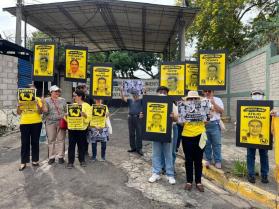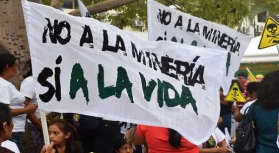President Funes Asks for State Pardon on 30th Anniversary of Romero Assassination
“If they kill me, I will be reborn in my people’s struggle.”
Included in this update:
* Impunity Reigns in Trial over Murdered Environmental Activist
* National University Re-opens after Two-week Student Occupation
For the first time ever on Wednesday, March 24, the Salvadoran State,represented by the country’s first leftist president Mauricio Funes,honored the life of Monseñor Oscar Arnulfo Romero and apologized forits role in his murder on the 30th anniversary of his assassination byState-linked death squad agents. Monseñor Romero, Archbishop of SanSalvador, is revered by Salvadorans for his ministry, his unflinchingadvocacy for El Salvador’s poor majority and open condemnation ofUS-funded repression by the right wing Salvadoran government, whichresulted in his assassination on March 24, 1980 (listen to a BBCsegment on Romero’s life and memory here).
President Funes apologized for the government’s role in Romero’s martyrdom at a public ceremony to unveil a new mural dedicated to Romero at the Comalapa Airport. "I ask forgiveness in the name of the Salvadoran State for this assassination, perpetrated 30 years ago, firstly from his family, secondly from the Salvadoran people and thirdly from the Catholic Church and religious organizations,” declared Funes. Monseñor Romero’s brother, Gaspar Romero, formally accepted the long-awaited government apology responding, “With humility, love and gratitude, I accept this request for pardon, even though it comes 30 years later.” The President also announced plans for additional “moral and symbolic” State reparations for Romero’s assassination, including a video about Romero’s life and work, constructing a plaza in his name and promoting March 24 as National Monseñor Romero Day, officially instituted as a national holiday by Legislative Assembly vote this past March.
In addition to the State-sponsored events, civil society coalitions organized a number of activities including an all-night vigil, a “pilgrimage” and a demonstration. On Saturday, March 20, thousands of Salvadorans and internationals converged on the Metropolitan Cathedral in San Salvador for an overnight vigil in honor of Romero, a celebration full of music, dance and personal testimony. On March 24, in addition to the massive pilgrimage in honor of Romero that wound through San Salvador, people demonstrated at the statue of Major Roberto D’Aubuisson - the intellectual author of Romero’s assassination and founder of the right wing ARENA party (the Nationalist Republican Alliance). Demonstrators threw shoes at the statue, painted the word “murderer” on it and drew dead bodies on the ground surrounding the monument. This act of protest was intended to highlight the violent roots of the ARENA party and the lack of justice for the victims of State-sponsored repression.
Impunity Reigns in Trial over Murdered Environmental Activist
On March 15th the Sensuntepeque Sentencing Court, in the department of Cabañas, absolved Oscar Menjívar of all charges in connection to the attempted murder of anti-mining activist Ramiro Rivera. The ruling was made while members of the Cabañas Environmental Committee (CAC) rallied for justice outside the courthouse (read the statement by the National Roundtable against Metallic Mining on the ruling). The trial addressed a murder attempt that took place in August of 2009 when Ramiro Rivera, Vice President of the CAC, was shot 8 times in the back and survived. Rivera identified his attacker as Oscar Menjívar whom community members say worked as a paid promoter for the Canadian mining company Pacific Rim. Four months later Rivera was murdered by gunmen on his way home from fishing.
People who attended the trial noted serious irregularities in the process. Menjívar, known by his neighbors to have limited financial resources, was represented by a team of lawyers from El Salvador’s four most prestigious law firms – raising the question of who was financing his defense. Witnesses also report that one of the tribunal judges slept through a significant portion of the trial. According to the Rivera family’s lawyer, the tribunal recognized that there was significant evidence pointing to Menjívar’s guilt, but it ruled “not guilty” because the principal eyewitness – Rivera himself, murdered last December – was not present to testify against Menjívar.
The CAC has denounced the ruling as an act of impunity, declaring, “In Sensuntepeque it is not strange that the innocent [who are poor] are put in prison and the criminals that are supported [financially] or that have money go free…This is a great challenge for those of us that live in the threatened communities, threatened first by the mining projects and also by the supporters of this mining company called Pacific Rim.”
National University Opens after Two-week Student Occupation
On Wednesday, March 3, a group of high school students who were denied admission to the University of El Salvador (UES) shut down the San Salvador campus and demanded over 500 new slots for the incoming class. University Dean Rufino Quezada announced that he would “not negotiate with masked students” and called for police to unchain the gates and arrest the aspiring university students, an act that would directly violate the legal autonomy of the UES. Minister of Security Manuel Melgar refused the dean’s request and encouraged the university administration to exhaust all avenues of negotiation. After almost 2 weeks, the occupation ended on March 16 following mediation by Human Rights Ombudsman Oscar Luna between the aspiring students and the administration, and without police intervention.
The problem of limited space for incoming students has been a source of increasing conflict at the UES since 2000. The organized student movement considers the general problem of accessibility to be in violation of the constitutional right to education. However, this year’s conflict divided the university movement into two blocks: one block of 5 student organizations supporting the occupation of the UES and the demand for mass admission; and a second block of 20+ organizations (including the Roque Dalton University Front, FURD) that consider the issue of university access to be a question of funding and resources, which must be first addressed before increasing student admission numbers in a responsible fashion.
After Quezada called for police intervention, the second university block held peaceful demonstrations outside the UES, calling on the occupying students to re-open the campus while also demanding that the police refrain from entering the university. According to members of the FURD, this second block negotiated with the administration during the occupation and eventually reached an agreement that every university department, in cooperation with students, would admit more students based on departmental capacity and that the UES administration would create a permanent table of dialogue to address this issue. These are the same terms that aspiring students and the administration agreed to on March 16. Members of the FURD went on to compliment the Funes Administration and Minister Melgar on managing the occupation prudently.

 "I am a CISPES supporter because continuing to fight for social justice and a more people-centered country means continuing the dream and sacrifice of thousands of my fellow Salvadorans who died for that vision.” - Padre Carlos, New York City
"I am a CISPES supporter because continuing to fight for social justice and a more people-centered country means continuing the dream and sacrifice of thousands of my fellow Salvadorans who died for that vision.” - Padre Carlos, New York City

